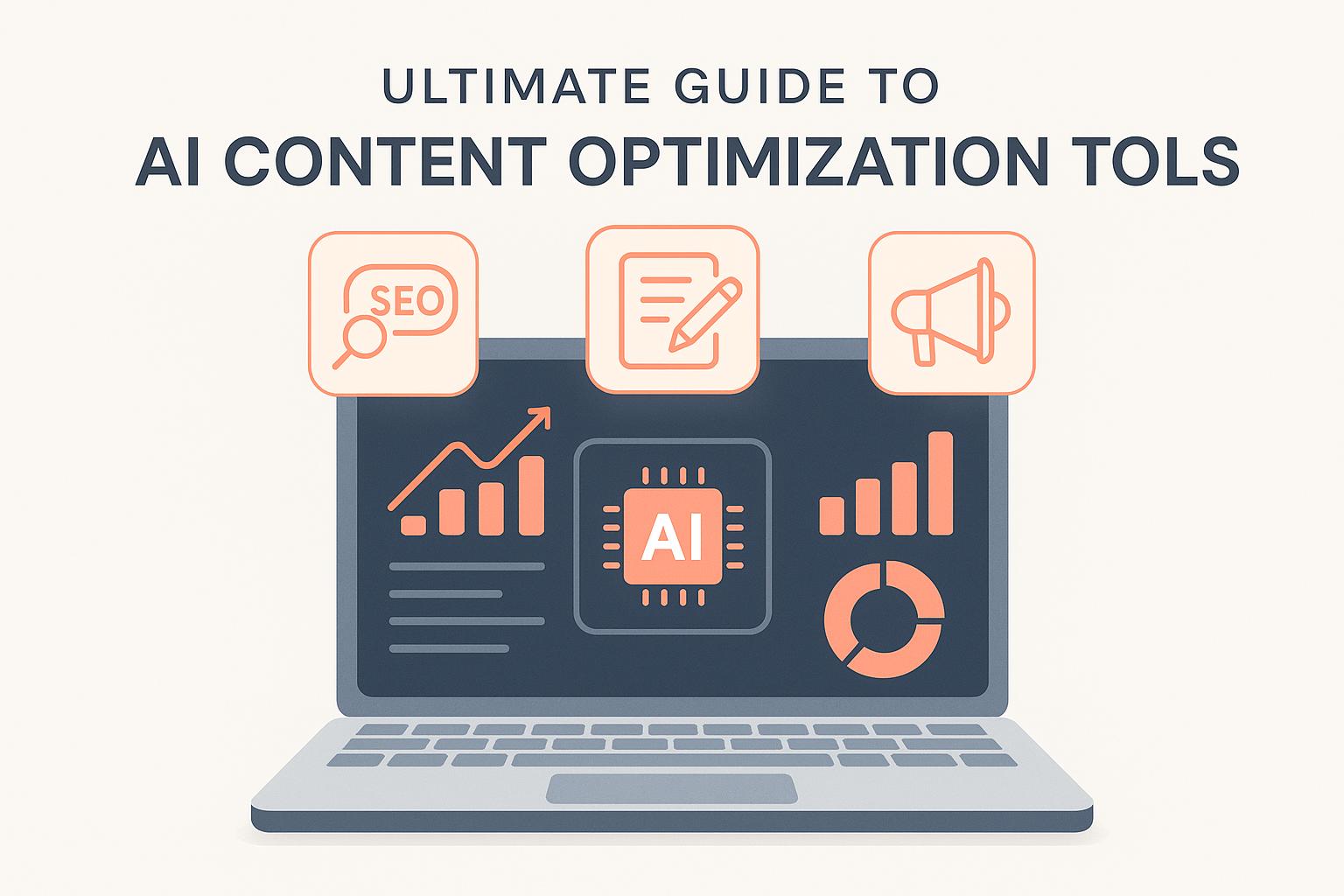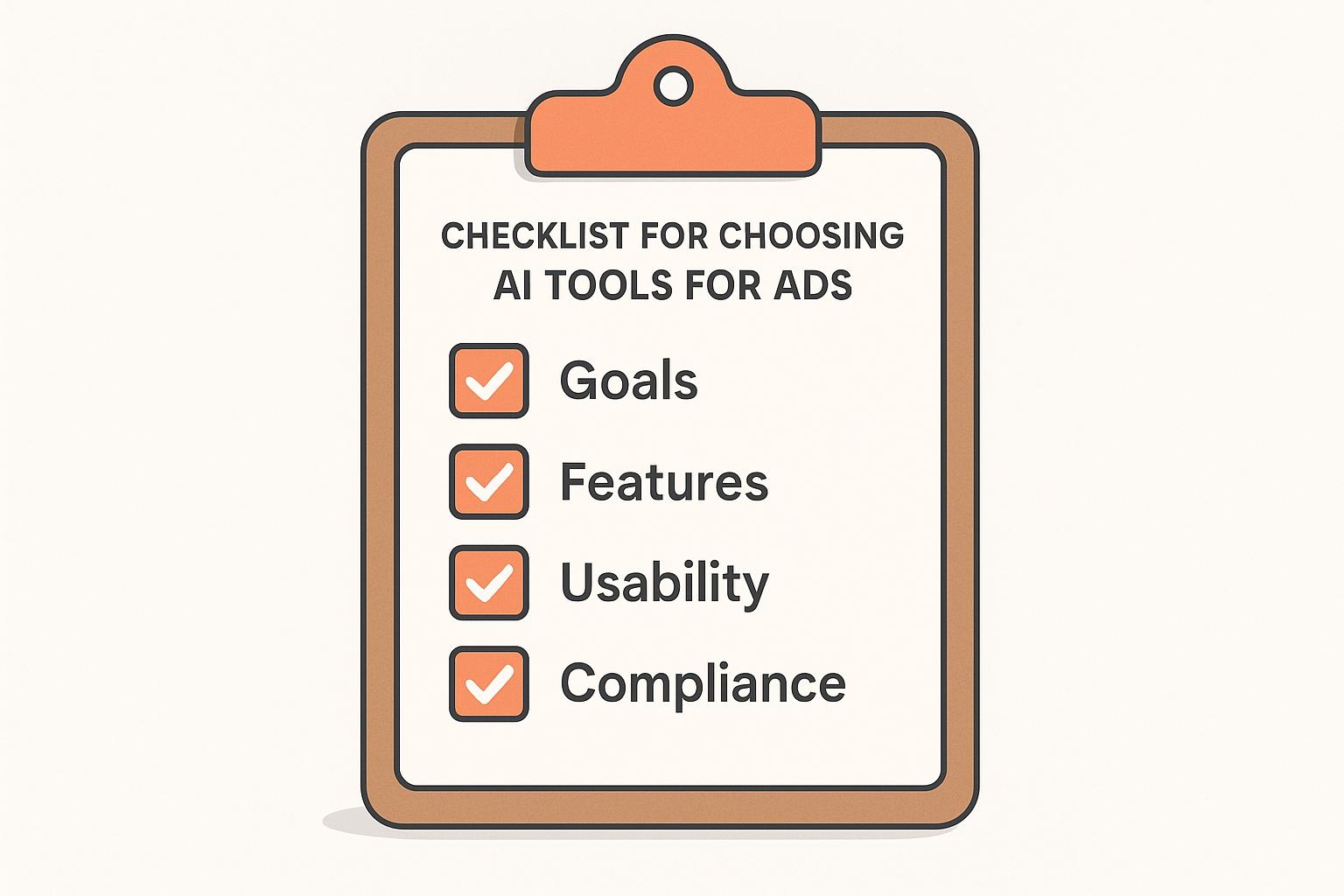If you’re looking to improve your SEO without spending a dime, free AI tools for keyword research can help. These tools analyze search data, suggest keywords, and provide insights on search volume, competition, and trends. Perfect for small businesses and solopreneurs, they save time and money while helping you create content that aligns with what your audience is searching for.
Here are some top free options:
- Ubersuggest: Offers SEO difficulty scores, search volume, and seasonal trends. Free plan limits you to 3 searches per day.
- WordStream Free Keyword Tool: Provides exact search volumes and competition analysis. No daily search limits, but email is required for full results.
- Google Keyword Planner: Gives detailed search volume and competition data. Works well for both SEO and PPC strategies.
- Ahrefs Free Keyword Generator: Limited results but accurate suggestions for Google and YouTube keywords.
- Keyword Surfer: A Chrome extension for real-time keyword data directly in search results. Unlimited searches but with basic features.
These tools come with limitations like daily search caps or reduced data, but combining multiple tools can help you get a complete picture. For U.S.-specific insights, tools like WordStream and Google Keyword Planner stand out by offering localized data. Whether you’re optimizing for organic traffic or planning a local campaign, these tools are a great starting point.
10 Free Keyword Research Tools - ALL $0
What to Look for in Free AI Keyword Research Tools
Finding the right tool means focusing on those that provide the most essential SEO data. By identifying the features that truly matter, you can sidestep unnecessary distractions and choose tools that bring genuine value to your business.
Key Features to Evaluate
A good starting point is search volume data. This metric shows how often people search for specific terms each month, helping you zero in on keywords that can drive meaningful traffic.
Look for tools that offer keyword suggestions powered by AI. These tools analyze patterns and generate long-tail keywords that not only attract more targeted traffic but also face less competition. The best tools will also provide semantic variations that align with your objectives.
Competitor analysis is another valuable feature. Tools that reveal the keywords your competitors rank for can highlight gaps in your strategy and uncover opportunities you might have overlooked.
Don’t forget about SERP insights. Top tools provide details like cost per click, keyword difficulty, and even SERP features such as People Also Ask sections. This data helps you understand not only what’s being searched but also how competitive those terms are and what type of content is already ranking.
While these features are incredibly useful, keep in mind that free plans often come with limitations.
Understand Limitations of Free Plans
Free tools can be helpful, but they come with restrictions you need to be aware of. One common limitation is daily search limits. For instance, Ubersuggest is a great tool for content marketing, but its low daily search cap can make it tricky to conduct extensive research.
Another limitation is reduced keyword results. Paid versions might generate hundreds of suggestions, but free plans often limit you to just 10–50 keywords per search. Some tools even add time constraints to your usage.
You’ll also encounter limited data access. Free tools may not provide critical metrics like keyword difficulty, search intent, or traffic potential. This lack of depth can leave you without the insights you’d get from more advanced SEO platforms.
"The short answer is: only when you need to. If you can get all the data you need without going over the allowances of one of the free plans above, there's no reason to upgrade to a paid plan (or switch to a fully paid tool)."
- Kiera Abbamonte, Content Writer, Zapier
One way to work around these limitations is by combining multiple free tools. For example, you can use keyword research tools alongside resources like Google Analytics, Google Search Console, and social media analytics to gain a more complete view of your digital marketing performance.
Beyond features and limitations, it’s also important to think about the value of localized data.
The Value of U.S.-Specific Data
If your audience is primarily in the U.S., localized data becomes critical. Search behavior can vary widely by region, so tools that let you filter by location or language are essential for effective local SEO and targeted campaigns.
Search volume accuracy is a key factor here. A keyword might have a high global search volume but see very little activity in the U.S. Tools that provide U.S.-specific data can help you avoid wasting time on keywords that won’t perform in your market.
Keyword relevance also changes by location. The terms your company uses might not match the phrases your audience is searching for, and this gap can grow when factoring in regional dialects or language differences. Long-tail keywords - which make up about 70% of all search queries - often reflect these localized language patterns.
Consider this: 90.63% of web pages get no traffic from Google. That’s a staggering number and a clear reminder of why accurate, localized data matters. U.S.-specific insights allow you to avoid wasting resources on irrelevant keywords and focus on terms that will actually drive results.
AI-powered tools are designed to stay in step with the latest search engine updates, ensuring that the keywords they generate meet current SEO standards. When these tools also include U.S.-specific data, they provide a clearer picture of what works for American audiences, helping you avoid the pitfall of targeting globally popular keywords that fall flat in your market.
AI Marketing List: Your Go-To for AI Tools
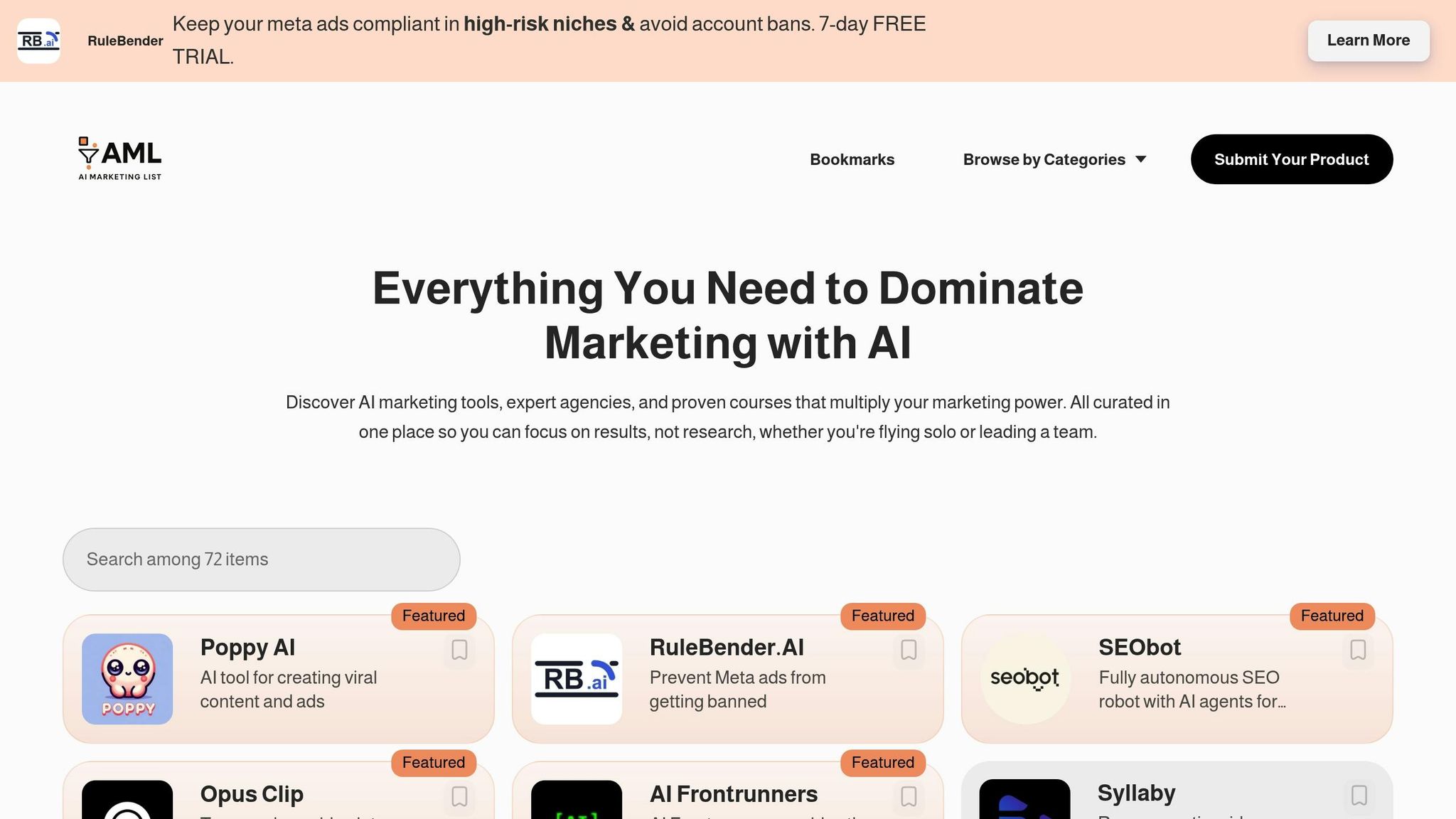
Finding the right keyword research tool can feel like searching for a needle in a haystack. That’s where AI Marketing List steps in. This curated directory simplifies the hunt by presenting a well-organized selection of AI-powered marketing tools, making it easier to discover solutions tailored to your needs.
The platform categorizes tools by marketing function, so whether you’re looking for help with keyword research, content creation, email campaigns, or analytics, you’ll find everything in one place. Each listing includes key details and direct product links, saving you time and effort.
What sets AI Marketing List apart is its focus on quality over quantity. Instead of overwhelming you with endless options, it highlights tools that are practical and relevant to today’s marketing challenges.
How AI Marketing List Simplifies Tool Discovery
Navigating the platform is a breeze, thanks to its structured category system. Say you’re focused on improving your keyword strategy - you can head straight to the "SEO and Keyword Research" section and find tools designed to meet U.S.-specific needs.
The directory also makes comparing tools straightforward. You can review multiple options side by side, assessing their features and capabilities before diving deeper into any one platform. This streamlined process complements earlier discussions about free AI-driven keyword research tools and their benefits.
For small businesses and solo entrepreneurs, this platform is a game-changer. It offers a handpicked collection of AI marketing tools, specifically chosen to address the challenges of modern digital marketing. Whether you're just starting out or refining an existing strategy, AI Marketing List has you covered.
sbb-itb-ad96eed
Best Free AI Tools for Keyword Research
If you're a small business owner or solopreneur looking to boost your SEO game without breaking the bank, free AI keyword research tools can be a game-changer. Below, we dive into some popular options, highlighting their strengths and limitations to help you decide which tool suits your needs.
Ubersuggest
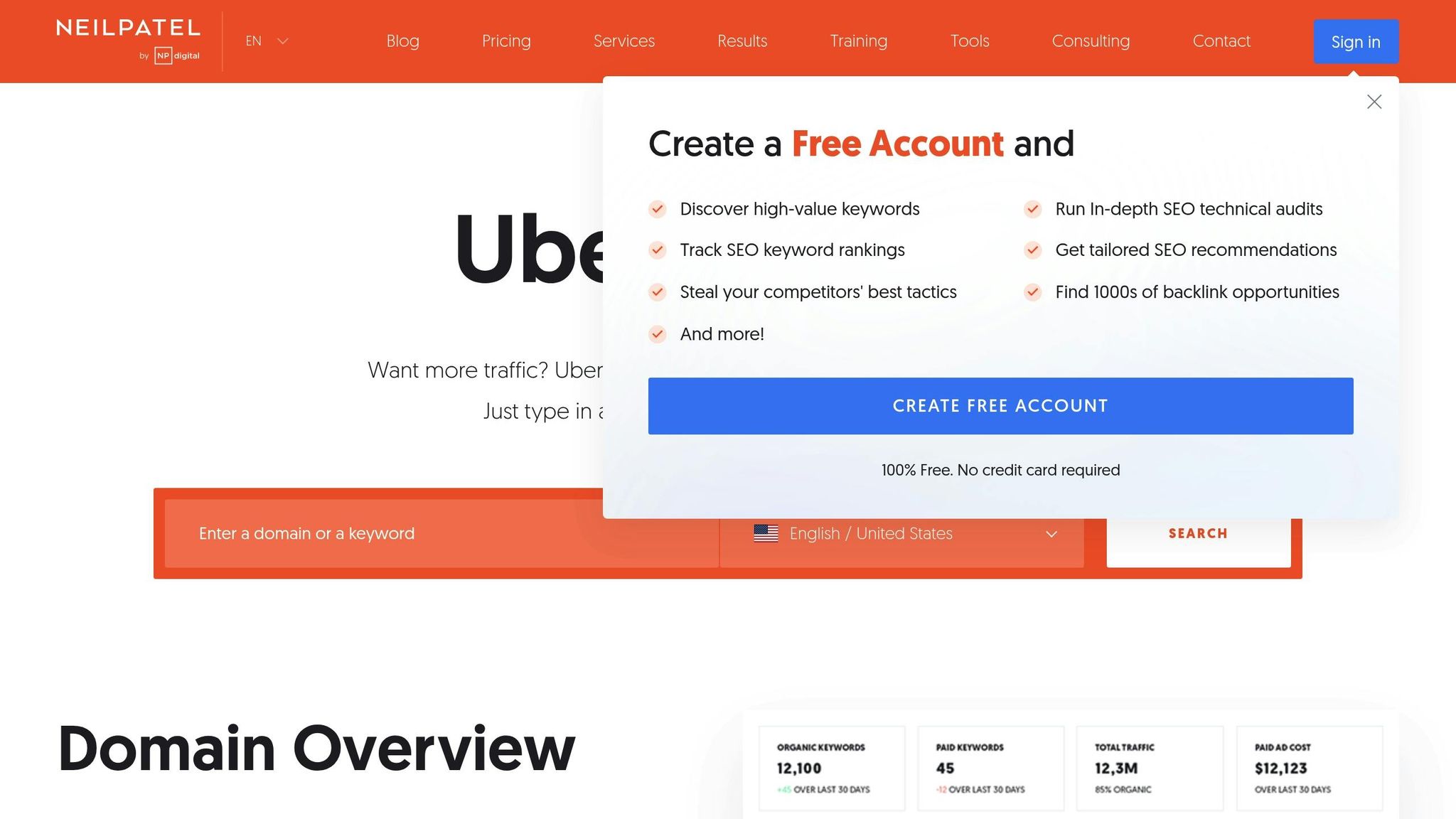
Created by Neil Patel, Ubersuggest is a handy tool for keyword analysis, offering SEO difficulty scores and content ideas. Its free plan allows up to three searches daily, making it a great fit for targeted research.
With Ubersuggest, you'll get key metrics like search volume, competition levels, and seasonal trends. It also includes a content suggestions feature, which shows top-performing pages for your chosen keywords. This can help you understand what type of content resonates with your audience. The SEO difficulty score is particularly useful for newer websites, helping you prioritize keywords that are easier to rank for.
WordStream Free Keyword Tool
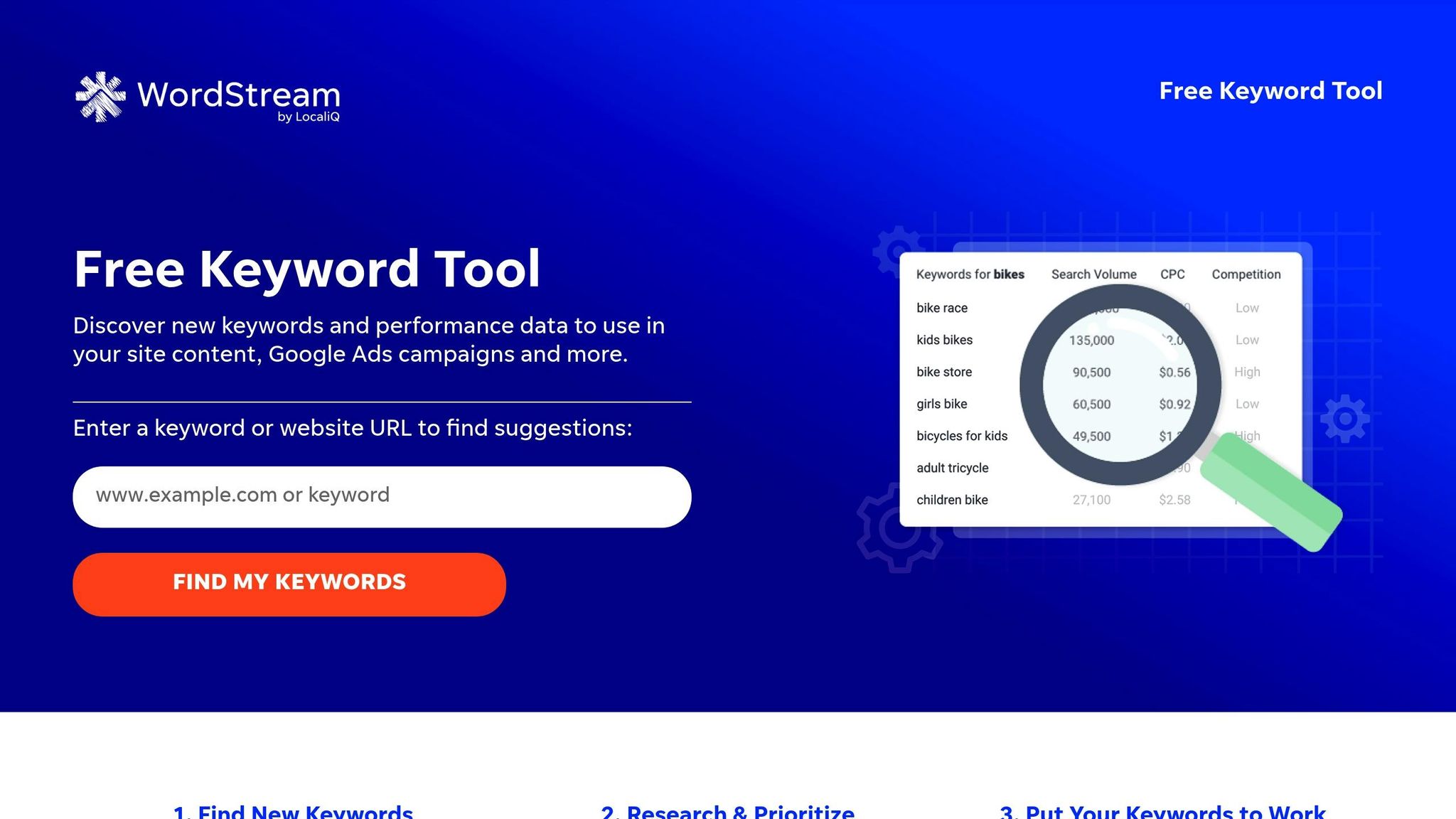
WordStream's free tool is unique because it provides exact search volumes instead of vague ranges. Right after your search, it displays the top 25 keyword suggestions and emails you the full list for further exploration.
This setup is ideal if you want to start small and avoid being overwhelmed by too much data at once. Plus, the tool offers clear competition analysis and precise U.S. search volumes, making it a reliable resource for uncovering valuable long-tail keywords.
Google Keyword Planner
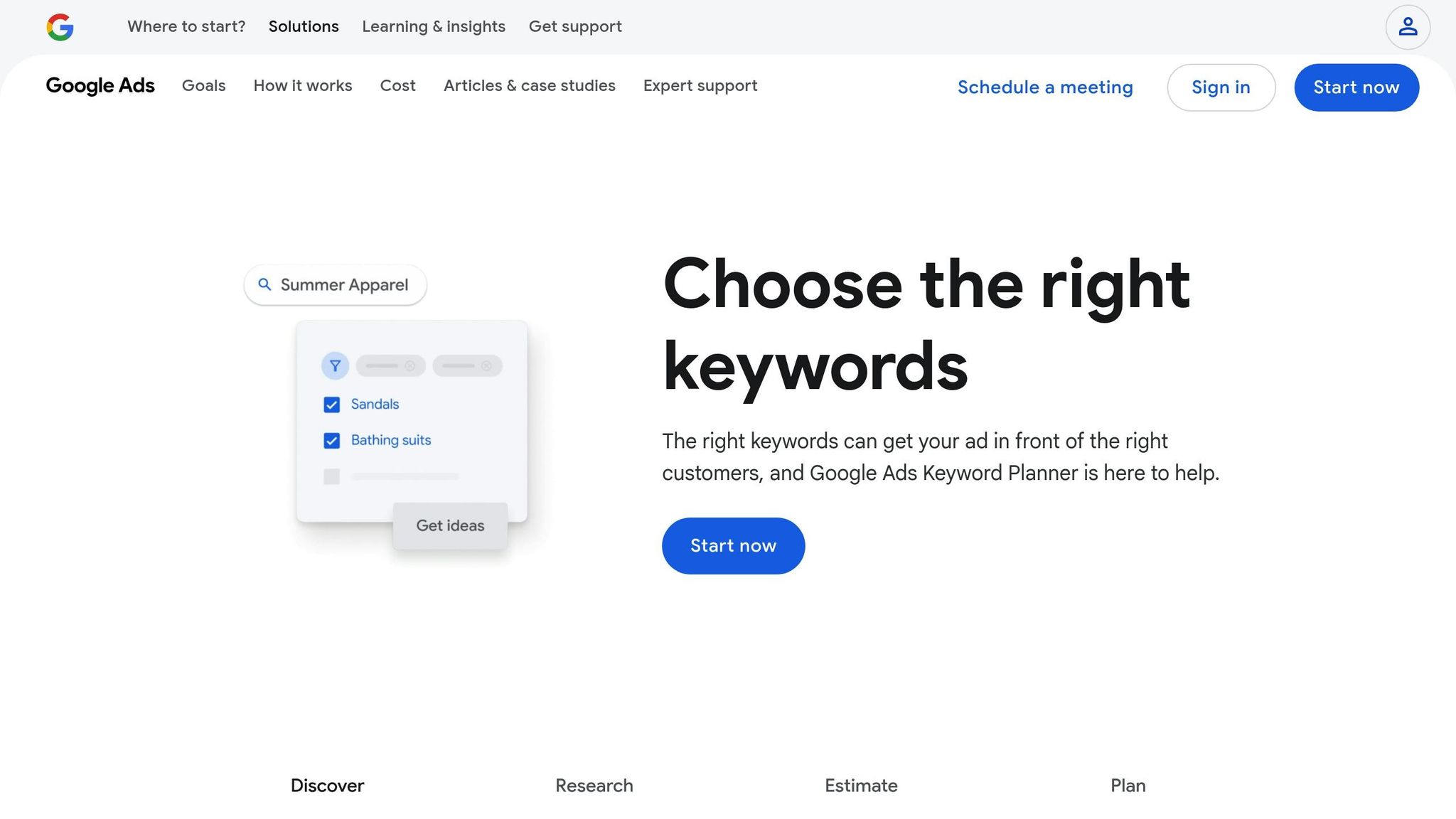
Google Keyword Planner is a classic tool that delivers highly accurate data straight from Google's database. It's perfect for planning both SEO and PPC campaigns, as it provides detailed search volume, competition data, and bid estimates.
With a free Google account, you gain full access to these insights, which integrate seamlessly with Google Ads. This makes it especially useful if you're running paid campaigns alongside organic strategies.
"The right keywords can get your ad in front of the right customers, and Google Ads Keyword Planner is here to help."
While primarily designed for PPC, the tool's data is also valuable for organic keyword planning. Its forecasting features allow you to spot seasonal trends and estimate budget needs effectively.
Ahrefs Free Keyword Generator
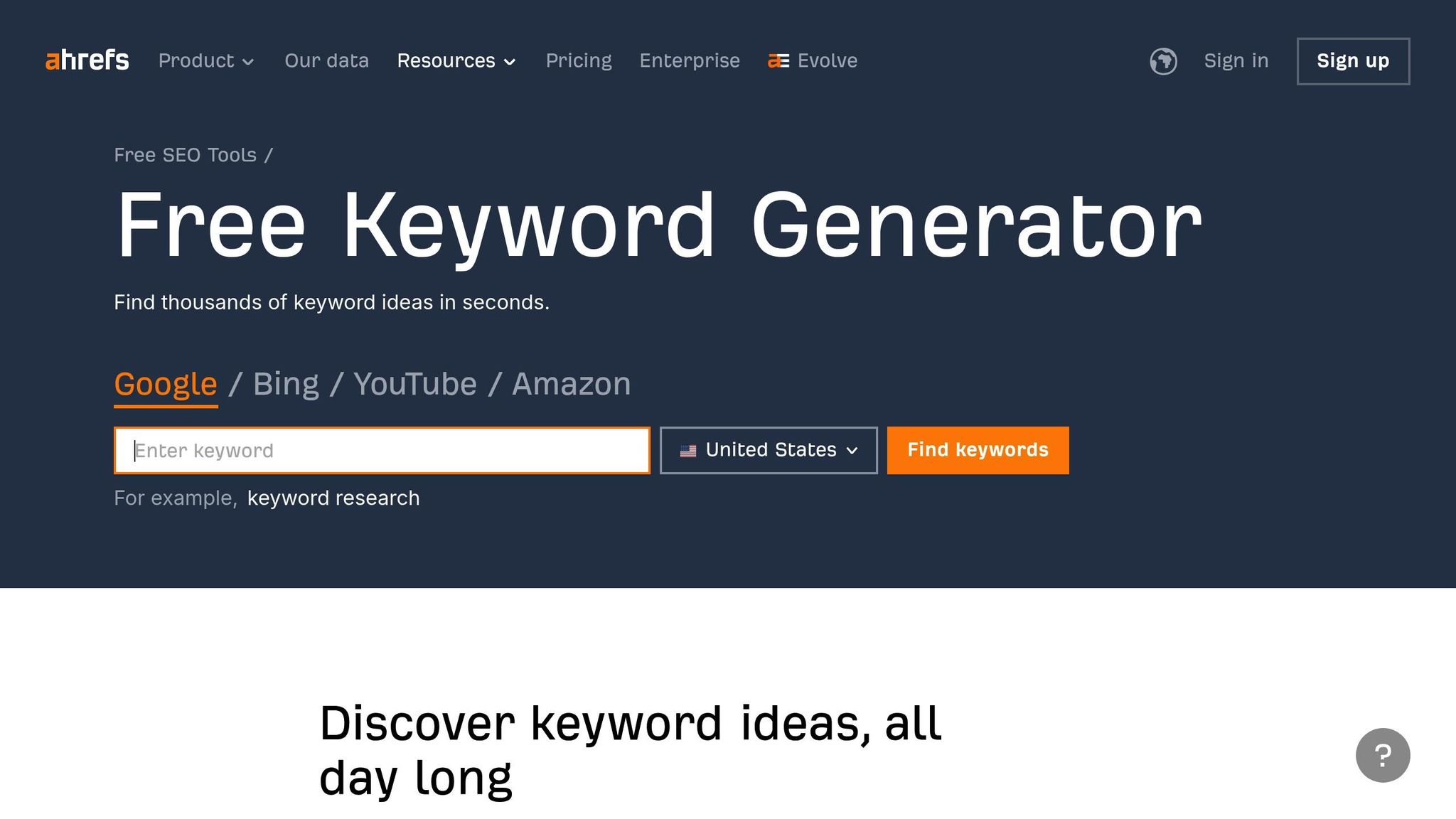
Ahrefs offers a limited but powerful free keyword generator. It provides keyword ideas and search volume estimates for both Google and YouTube, though the results per search are capped.
The tool's strength lies in its accuracy and variety of suggestions, thanks to Ahrefs' extensive database. For content creators, the YouTube keyword feature is a standout, helping you plan video strategies with precision. In tests, Ahrefs scored a 39.53% accuracy rate for search volume predictions. While not perfect, it competes well in a field where exact numbers are notoriously challenging to pin down.
Keyword Surfer
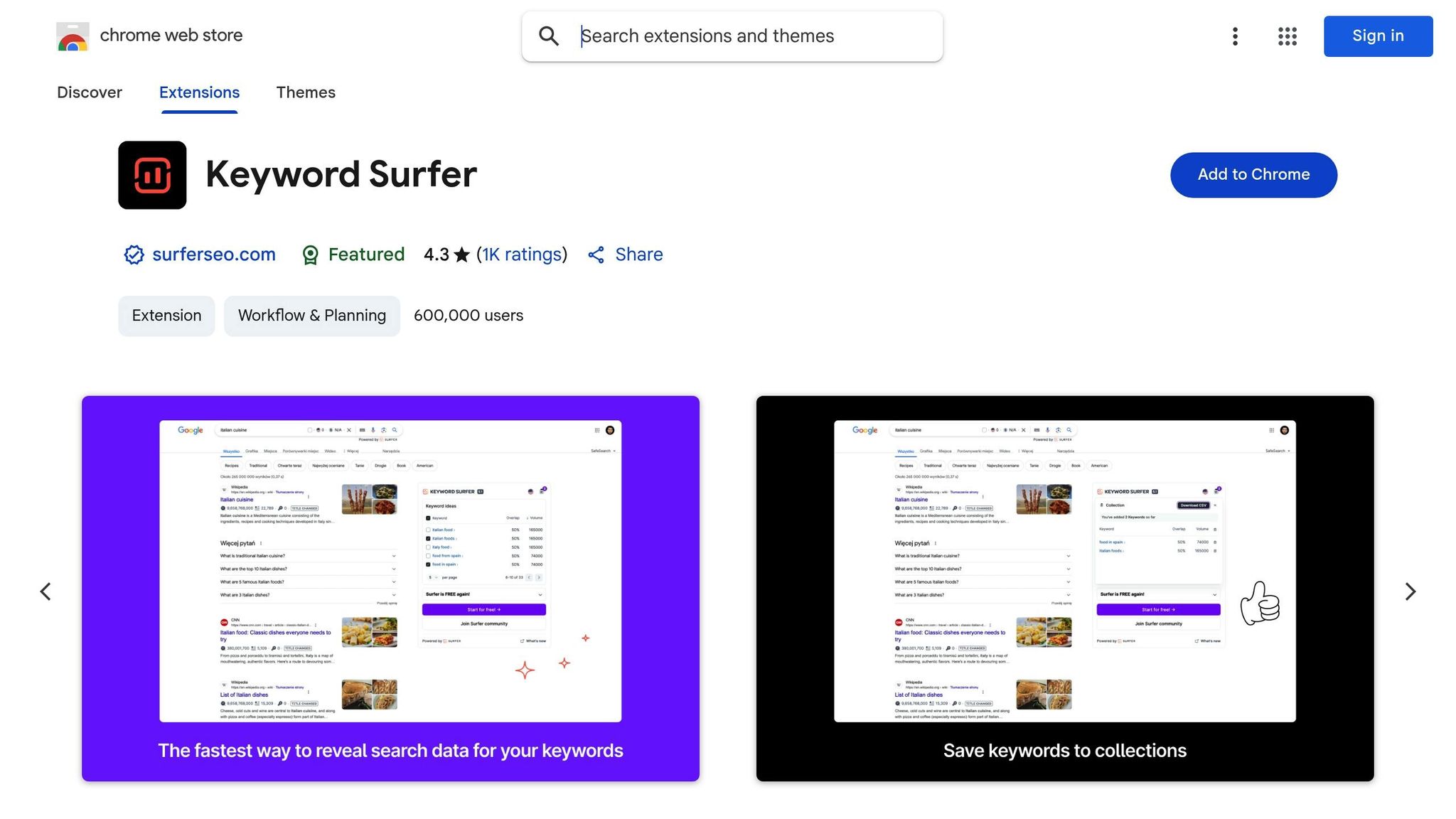
If you're after a tool that integrates seamlessly into your workflow, Keyword Surfer is worth checking out. This free Chrome extension offers unlimited searches and displays real-time search volume alongside related keyword suggestions directly within Google search results.
This integration is a time-saver, allowing you to assess keyword opportunities while browsing competitor content or conducting general research. It also provides search volume data for the page you're viewing, giving you a quick snapshot of the keyword landscape without needing to switch between tools.
Keyword Surfer works well in combination with other tools like Google Keyword Planner or Ubersuggest, making it a versatile addition to your research arsenal. Stay tuned for our comparison table in the next section to find the best fit for your needs.
Comparison Table: Features and Limitations
When deciding between free AI keyword research tools, it’s helpful to weigh their strengths and drawbacks to find the best fit for your business needs. The table below highlights how these tools stack up:
| Tool | Daily Search Limit | U.S. Data Support | Key Strengths | Main Limitations |
|---|---|---|---|---|
| Ubersuggest | 3 searches per day | ✓ Yes | Content ideas, SEO difficulty scores, seasonal trends | Very limited daily searches |
| WordStream | No daily limit | ✓ Yes | Exact search volumes, top 25 instant results | Email required for full keyword list |
| Google Keyword Planner | Unlimited with Google account | ✓ Yes | Most accurate data, PPC forecasting, bid estimates | Better for paid ads than organic SEO |
| Ahrefs Free Generator | Limited results per search | ✓ Yes | YouTube keyword data, high accuracy (39.53%) | Capped results, no daily search tracking |
| Keyword Surfer | Unlimited searches | ✓ Yes | Real-time integration, Chrome extension convenience | Requires browser extension, basic features only |
Let’s dive deeper into what sets these tools apart and where they might fall short.
For starters, accuracy levels differ. Studies suggest Google Keyword Planner has a 40.94% accuracy rate, slightly edging out Ahrefs at 39.53%. This indicates that relying on just one tool might not always provide the full picture. Combining tools can help bridge these gaps.
Pricing for upgrades is another consideration. While all these tools offer free versions, their paid plans vary significantly. Ubersuggest starts at $29/month, whereas Ahrefs’ entry-level plan begins at $99/month. If you only need occasional keyword research, Ubersuggest’s free version might suffice. However, for more extensive sessions, tools like WordStream or Keyword Surfer, with their looser usage limits, could be more practical.
Data precision is another area where tools differ. WordStream, for instance, provides exact search volumes, which can be particularly useful for forecasting traffic in U.S. markets. In contrast, Google Keyword Planner often gives broader ranges, which may not be as precise.
Ease of use varies as well. Keyword Surfer’s Chrome extension is straightforward and user-friendly, making it a breeze to validate keywords while browsing competitor sites. On the other hand, Google Keyword Planner, while powerful, requires some familiarity with the Google Ads interface, even if you’re using it for organic research.
Finally, data freshness plays a crucial role. Free tools don’t always update their databases as frequently as their paid counterparts, which might impact their effectiveness for seasonal trends or time-sensitive topics. That said, Google Keyword Planner stands out by pulling data directly from Google’s active search database, ensuring up-to-date insights.
Ultimately, your choice will depend on your specific needs. For a well-rounded approach, many solopreneurs start with Google Keyword Planner for baseline data, supplement it with Ubersuggest for content ideas, and use Keyword Surfer for real-time checks during competitor analysis. Each tool has its niche, and combining them often leads to the best results.
Conclusion
Free AI keyword research tools can be a game-changer for solopreneurs and small businesses working with limited resources. These tools provide essential SEO insights, such as search volume, keyword difficulty, and emerging trends, without the hefty price tag of premium software.
Take, for example, a local business aiming to attract more targeted search traffic. With the help of these tools, they can adopt data-driven strategies that were once reserved for companies with large marketing budgets. This accessibility helps level the playing field, allowing smaller businesses to compete more effectively in the digital space.
Of course, free tools come with their own set of challenges, like daily usage limits. But these limitations can often be sidestepped by using a combination of tools and focusing on the most critical keywords.
Finding the right mix of tools doesn’t have to be complicated. Resources like AI Marketing List make it easier by categorizing free tools by their functions and use cases. This directory not only helps users compare options but also provides guidance on how to combine tools to offset individual shortcomings. By leveraging these resources, small businesses can thrive in a competitive online environment.
FAQs
What are some tips for getting accurate SEO data when using free AI keyword research tools?
To get more precise SEO data using free AI keyword research tools, it’s a good idea to combine multiple tools. Each tool has its own limitations, so cross-checking results can help fill in missing details and minimize inaccuracies.
You can further refine AI-generated insights by manually reviewing search trends, analyzing what competitors are doing, and staying updated on changes within your industry. For a deeper dive, you might occasionally turn to paid tools to access more detailed and current data. By blending AI automation with hands-on analysis, you can create a more reliable and well-rounded SEO strategy.
What should you look for in a free AI tool for keyword research in the U.S. market?
When choosing a free AI tool for keyword research focused on U.S. markets, keep a few key factors in mind. Look for tools that understand regional search habits, use American English spelling and terms, and consider local nuances to deliver relevant keyword ideas. Additionally, ensure the tool accounts for U.S.-specific details like currency formats ($), imperial measurement systems, and trending topics. These elements can play a big role in shaping an effective keyword strategy.
What’s the best way to combine free AI keyword research tools to improve my SEO strategy?
To make the most of free AI keyword research tools, begin by spotting popular and trending keywords. Tools like Google Keyword Planner or Google Trends are great starting points for this. Once you’ve identified some initial keywords, dig deeper with platforms such as AnswerThePublic or Keyword Generator. These tools can help you uncover related questions and long-tail keywords that match your audience’s search habits.
After gathering your list, it’s time to evaluate. Use tools like Moz's Keyword Explorer or WordStream's Keyword Tool to analyze the competition and search volume for each keyword. This step ensures you’re focusing on terms with the best potential to drive traffic.
By combining these resources, you can craft a keyword strategy that covers discovery, validation, and prioritization - giving your SEO efforts a boost, all without spending a penny.
